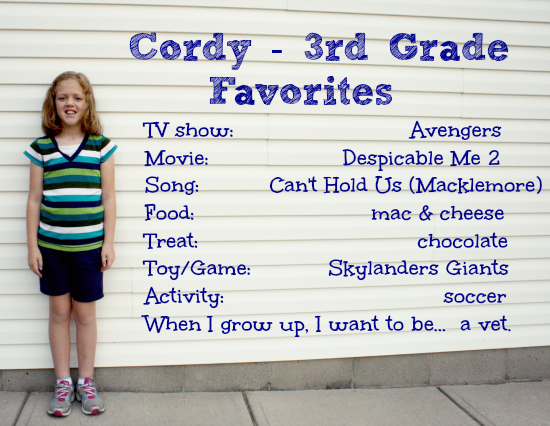Two nights ago our elementary school held their annual Open House, where we found out about plans for the year, got pitched for PTA volunteer work, and had the chance to meet the teachers and see the classrooms. We go to this every year, even though we generally have met the teachers and know a lot about the classroom long before this date.
This year’s event wasn’t as well attended, probably due to the heat. The school has no air conditioning and is a brick building with small windows, which transforms it into a brick oven by the end of a 90+ degree day. Even after sunset it was still over 90 degrees inside the building.
Mira had gymnastics scheduled at the same time, so only Cordy and I were at the school. We walked in and strolled the halls before things got started. Well, I strolled. Cordy skipped and bounced down the halls, despite the heat. Her teachers, current and previous, were nearby. One asked, “So is she always this chipper?”
“Generally,” I responded, “Unless she’s had a long day and there’s no one around but close family.”
“Does she wake up this way?”
“Yep, she springs out of her room at 6am sharp every morning, fully awake and ready to go.” I could see the weary look to my response. I understood. I added, “She doesn’t get that from me at all. I move slowly in the morning.” They murmured similar sentiments to waking up.
Mira’s teacher then saw me and asked, “Is it just Cordy with you?” I nodded. “Mira must be at gymnastics then.”
“Oh, did she tell you she had gymnastics tonight?” I asked.
She smiled. “No, but she talks about it ALL the time, so I guessed that the only thing that would keep her away from school would be gymnastics!”
It seems she already has my younger daughter figured out.
We sat through the PTA meeting, then set off to see the classrooms. Cordy was giving me the guided tour as if I had never been there before:
“This is our school library, where we can check out books. It has fiction and nonfiction sections.”
“Thank you, Cordy, but I’ve been here several times, remember?”
“And this is my teacher, Mrs. C. Mrs. C, this is my mom, but you can call her Christina.”
“Yes, sweetie, we’ve met before. You were there as well.”
I gave up and played along for awhile, pretending it was all new to me.
Her reading teacher told me that Cordy continues to be an advanced reader, but she’d really like for Cordy to choose more challenging books in the classroom. When given the option, she’ll always go for the easier books because they’re familiar characters and storylines. It’s true, most of what she reads is far too easy for her. We all question if she’s even reading the content considering the speed with which she turns pages. But if you quiz her, she can usually tell you what happened. I agreed and promised to nudge her towards higher level books at the library and in her monthly Scholastic order.
I read through Cordy’s writing journal and noticed that she talked about what a “bother” her sister was more than once. Then we were invited to go see the biographies that were posted in the hallway. Kids had paired off and interviewed each other in class, then wrote a bio about the other person. Somehow, I wasn’t surprised by what the other kid learned from Cordy:
 You may notice that she really wants the class to know about her little sister.
You may notice that she really wants the class to know about her little sister.
We met briefly with the special needs teacher, who expressed her joy that things were going fairly well for Cordy so far this year. The bus is still arriving late each morning, which upsets her, but otherwise she’s only had minor problems that were easily redirected. The teacher told me that she gave Cordy a “Take 5” card to keep with her at school. If she’s ever feeling overwhelmed or just needs a break, she can flash her Take 5 card and visit the special needs classroom for five minutes. She knows she can’t use it to get out of doing an assignment, and so far she’s not used it much.
I can’t even begin to describe how happy I am that we’re not getting calls home about Cordy hiding under her desk or having outbursts at school. So, so happy. It’s such a relief.
Her special needs teacher did let me know that Cordy was getting frustrated in math, and the math teacher had spoken with her about ways to get through to Cordy. So I then went to visit the math teacher’s classroom. Cordy came with me for a few minutes, then she realized we were going to discuss areas where she wasn’t doing as well and asked to go hang out in the library for a bit.
Unlike Cordy’s reading teacher, who was her teacher for reading last year as well, Cordy’s math teacher never had the chance to work with her beyond a single assessment last year.
The math teacher started by telling me that Cordy has great logic and is easily capable of doing everything they’re learning in class. But, she then said that every time she introduces something new, where Cordy doesn’t immediately recognize how to solve the problem, Cordy shuts down and won’t even try it.
I knew what she was describing before she even finished telling me – it’s a common pattern of behavior for my oldest. I explained that Cordy is a perfectionist with severe anxiety over getting anything wrong. So if she sees something new that she’s unsure of, she’d rather not attempt it at all and protect herself from making a mistake. Cordy was also saying that the teacher hated her because she didn’t do perfect work. (Which distressed the teacher, since it wasn’t true!)
We chatted a little more about strategies to help her, and I promised I’d be in close contact to provide any suggestions or help I could to work past it. Her math teacher then told me a funny story about Cordy. (Everyone in the school seems to have one.)
The kids were sharing their answers to a homework word problem, and Cordy found a different way to do it than many of the other kids. The teacher asked her to come up to the front of the class and explain her method, since others might find it helpful as well.
Cordy did come up, and told everyone how she got her answer. Then she turned to her teacher, smirked and said, “How ya like me now?”
Oh, that kid.
Then it was on to Mira’s classroom. Her teacher was Cordy’s first grade teacher, and someone I went to high school with, so we’re familiar with each other. She told me Mira loves to be at school, and loves to read. I was surprised by the second part of that, but she assured me that Mira asks to read when she’s done with her work. Maybe she’s finally getting over her own stubbornness about reading?
Of course, the real subject for discussion was Mira’s, uh, discussion. Her teacher tried to gently say that Mira has a lot to say and loves to share with everyone. I brushed past the politeness and acknowledged that little girl never stops talking. I’m not kidding, either – anyone who knows her knows how rare it is for her to be silent. School is the greatest possible place for her, because it forces her to learn to hold it in and carefully consider what’s important enough to say with the small amount of time she’s given to talk.
But despite her chatty nature, she’s doing well in class. She’s very social, loves to participate (a bit of a know-it-all, really), and really loves being at school. We need to work on reminding her to wait her turn to talk, to not be overly affectionate (she hugs everyone, multiple times a day), and to try to hold her emotions in when she encounters something difficult or has an unpleasant change of plans. There’s no crying in schoolwork.
Overall? The open house reinforced that my kids may be a little quirky, but there’s no doubt that they stand out and they’re doing well at school. Cordy may have trouble being social, but everyone remarks on how cheery she is. And Mira, well… Mira will be running that school by fifth grade, if not sooner.








